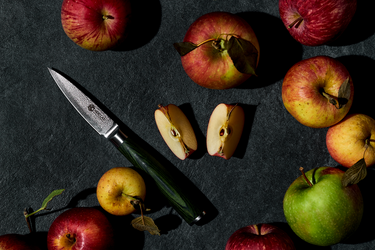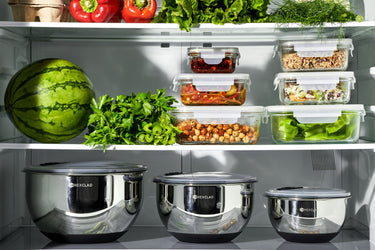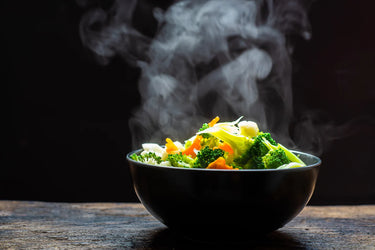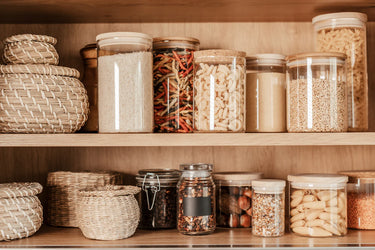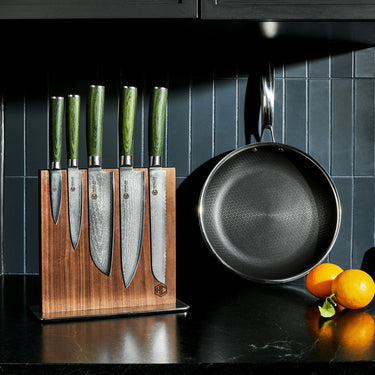Can You Put a Non-Stick Pan in the Dishwasher?
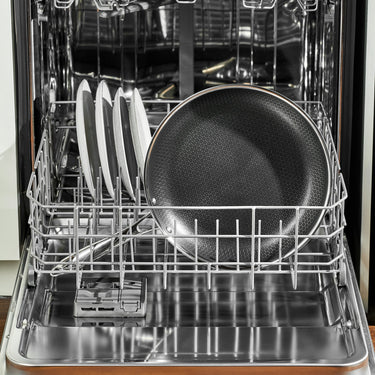
For those with a real love of cooking, we know how big messes can get when inspiration strikes. Sometimes, particularly wild or imaginative dishes might go uncreated if we’re worried about the mess getting too big.
This happens not because we are afraid of making a mess, but because we dread the hours of cleanup that are involved afterward. There’s nothing worse than making a huge meal for your extended family and then staring down all that cookware you have to hand wash. (We’re cringing at the thought.)
We know this can get overwhelming, and it’s natural to look for ways to make the job easier. One strategy to clean the mess up faster is by utilizing the dishwasher — you may be pleasantly surprised by how many cookware materials can go into the dishwasher.
In this article, we’ll cover the materials that can go in the dishwasher and those that can’t — and all the reasons why HexClad beats out the competition.
Which Cookware Materials Are Dishwasher-Safe?
Knowing which cookware materials you can put in the dishwasher will help save you a ton of time (and stress-induced migraines).
There are plenty of options, but sifting through the duds can get complicated.
Keep in mind that while certain materials are usually dishwasher-safe, you should always check the individual item. The manufacturer may have different recommendations for care, and you should always follow these.
Hybrid Cookware Materials
If you’re looking for the best of multiple worlds, look no further than hybrid cookware materials. By combining several different cooking metals, you can bring out each one’s strengths while also compensating for their weaknesses.
When armed with the right hybrid cookware, the only limit is your imagination.
HexClad hybrid pans are excellent at conducting heat on the stovetop, but their strong and durable exterior allows them to withstand the dishwasher, too. The addition of stainless steel in our pans also means you can use metal utensils on their surface without having to worry about scratches and scrapes.
Anodized Aluminum
Anodized aluminum goes through a chemical process that creates an especially strong exterior. While this process makes this cookware great for preparing food, it also leaves it vulnerable to corrosion in the dishwasher.
You might be able to get away with a few washes, but over time, you will almost definitely notice the integrity of the pan deteriorating. If you want your anodized aluminum cookware to last over time, you’re going to have to hand wash it. (Sorry.)
Some Ceramics
Ceramics are glazed as part of the creation process, and that outer protective layer helps them last, even with dishwasher use. Ceramics are a great option for special cooking techniques and are the traditional way to slow roast many meat dishes common in French cooking.
The most traditional form of ceramic cookware you will see is a Dutch oven. Ceramic cookware does come with a downside, however, and that is how few dishes you can make with it.
What it can do, it does exceedingly well — but the truth is that most dishes just shouldn’t be prepared in ceramic pots.
With typical ceramic pots and pans, you should only expect to use them for a few dishes rather than on a regular basis. This means your ceramics will take up a whole lot of room in the kitchen, but won’t be as handy as a stainless steel pot or pan.
Glass
Glass is easily cleaned in a dishwasher, and the cooking surface generally wipes off in a jiff, so your cleanup time shouldn’t be extensive.
However, like ceramic, glass isn’t generally used too frequently for dishes. Instead, glass cookware is often used for casseroles and similar dishes that go in the oven.
Another downside to glass is the amount of time you will have to wait before washing. Glass retains heat well, meaning you will have a long cool-down time before it’s safe to handle.
Stainless Steel
Stainless steel is one of the strongest materials used for cookware, but that’s not all — it also provides a great deal of ease and flexibility in the kitchen.
This material can be used to make most dishes and can withstand daily usage. While the price tag may sometimes be a little higher than other cookware options, it evens out when you consider the versatility and long lifespan.
This material is also great for use in the dishwasher, as it doesn’t corrode or degrade the same way other options will.
Teflon
Teflon is a brand of cookware that utilizes a chemical known as polytetrafluoroethylene. This type of cookware has a strong exterior and cooking surface to help prevent it from leaching into foods or corroding with wear and tear, and it can often stand the heat from the dishwasher.
That said, no matter what your cookware is made of, you should always take a look at the manufacturer’s instructions to guide you — this is non-negotiable.
Double-checking will guarantee that you get the most use out of your kitchenware.
Which Cookware Materials Aren’t Dishwasher-Safe?
Now that you’re familiar with some of the most durable materials and how they fare in the dishwasher, let’s talk about certain materials that cannot be put into the dishwasher. These guys should never be put in the dishwasher.
We’ll also discuss a few other setbacks that might make you want to avoid them.
Cast Iron
Cast iron is a very rugged material that can stand up to a lot of heat and use. A cast iron pan can create a hot surface that works wonders at searing meats. When seasoned correctly, food will slide out of the pan easy as pie.
However, the heated water in the dishwasher is detrimental to cast iron skillets and pans, as they are prone to rust. Some people also don’t enjoy the experience of cooking with them due to how heavy they are and how hot the handle can get.
Copper
Copper is a gorgeous-looking material for cookware, and it’s sure to impress your guests with its striking appearance.
These materials, however, will discolor and begin to deteriorate in the dishwasher, making them a hand wash-only product. All that glimmers isn’t gold.
Hand-Painted Ceramics
Painted ceramics are delicate and need to be hand-washed each time they’re used. Adding this type of cookware to the dishwasher can damage the integrity of the paint, leading to your cookware being ruined.
You will also want to take care not to overuse these pots and pans. They are delicate, so too much use will cause the designs to wear away (and possibly end up on your plate).
What Makes HexClad Non-Stick Cookware Dishwasher-Safe?
Unlike many of our competitors (especially when it comes to nonstick pans), HexClad is built to make delicious food in the short term and stay durable in the long term.
These are just some of the reasons our cookware can go into the dishwasher and still come out looking brand new.
Scratch-Resistant Nonstick Surface
Our nonstick surface is made through a revolutionary process that involves etching stainless steel cookware with our signature peaks and valleys system.
This helps the surface of the pan retain heat, stay resistant to scratches, and serve as an all-important nonstick cooking surface.
Resistant to Harsh Detergents
Our cookware is coated using a Japanese diamond system that keeps it stronger than the competition. It was non-negotiable for us that our pans be infused with the strongest material possible.
This way, they won’t react negatively to detergents or even your favorite metal utensils.
Unaffected by Hot Water
The triple-clad technology our pans feature allows the aluminum core to retain heat and release it just as easily.
Due to the powerful stainless steel exterior of HexClad pots and pans, hot water from the dishwasher won’t cause an issue.
Sorry, hours spent scrubbing away at your cookware by hand. It’s not you, it’s us.
HexClad Pans: Dishwasher-Safe Hybrid Cookware
As you may have gathered by now, HexClad pans are built for the long haul. In fact, we’re so confident that our products are made to last that all of our cookware comes with a lifetime warranty.
If anything causes your pans to corrode or scratch, we will replace them right away.
Sources:
Rust chemistry | Corrosion Doctors
Leaching Concept & Process | What is Leaching? - Video & Lesson Transcript | Study.com
